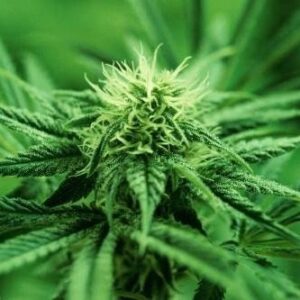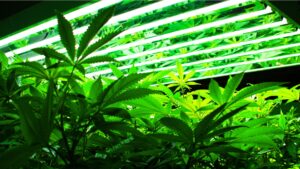Last year, CBD sales in the U.S. were projected to grow by 706%. A pretty steep mark to hit until you take a pause to look around for a moment. There are CBD shots sitting next to the 5-hour Energy display. America’s fathers are popping post-yard work gummies. New CBD stores are opening at the rate of a Starbucks/Dunkin’ Donuts love child.
A shift has occurred, and the sales have spoken – people are interested in what cannabis products can do for them. And despite that shift being reflected in the marketplace as well as the surrounding world, there is still an element of confusion. Is this pot? Can CBD get me high? Is it legal? All of these questions are derived from a common misunderstanding.
What is THC?
Tetrahydrocannabinol (THC) is a central cannabinoid found in cannabis, and it is the main psychoactive compound in the plant. Immediately identifiable by the “high” sensation it produces in interacting with the body’s endocannabinoid system, THC content is considered the measuring stick in pinpointing a strain’s potency.
What is CBD?
Cannabidiol (CBD) is another key compound found in cannabis plants. While it’s not psychoactive and won’t result in the euphoric effects you find with THC, CBD can still impart feelings of calmness and relaxation. In many areas of the United States, you can find CBD drinks, gummies, tinctures, etc. at any gas station or convenience store. But despite its widespread nature, the legality of CBD remains a point of confusion and concern for many.
The Legality of THC & CBD
With the culture surrounding cannabis products experiencing a shift, the legislation surrounding cannabis – and specific laws regarding marijuana, hemp and CBD – is also in a state of flux.
Is CBD Legal?
In short, yes. After 2018’s Farm Bill legalized the regulated production of hemp, CBD derived from hemp was also legalized for purchase and use. As long as the product is compliant with government standards, it is federally legal for use and consumption. That said, it’s up to each state to set its own policy.
While CBD is now legal at the federal level, there are certainly states with greater restrictions. Some states only allow medical use, some states permit CBD oil, and some states are even more stringent. In Idaho, even ultra-low THC formula CBD products remain illegal. According to their guidelines, legal CBD products must contain zero THC and be manufactured from approved areas of the plant.
Paired with the clashes between federal and state legislation, there’s also a disparity of how different government entities view CBD. Though hemp has been removed from the Controlled Substances Act, the DEA and FDA still classify CBD as a Schedule I drug if it contains more than 0.1% THC. This places it in the same category as heroin, ecstasy and LSD.
Despite these minor difficulties and discrepancies, new (and legal) CBD products pop up every day for every facet of life – from arthritis to skincare.
Can you Travel with CBD?
Thanks again to the passing of 2018’s Farm Bill, you’re able to travel between states with CBD products that are compliant with government standards. However, if you plan on flying with CBD, take the TSA’s restrictions on liquid into account. You wouldn’t want to lose a perfectly good tincture or a sparkling CBD Strawberry Lemonade!
Is THC legal?
Federally? No. That’s often a point of confusion in the legality of THC vs. CBD. With hemp products, there is federal approval with possible restrictions on the state level. But with marijuana products we have the feds saying ‘no’ with 30+ states saying ‘yes’ – and reaping benefits medically, socially and economically.
Currently, there are 10 states where the use of marijuana and THC products are legal recreationally and 23 more where it’s legal for medicinal use.
Drug Testing with THC and CBD
While substances like alcohol and cocaine remain in your system for mere days or hours, the signs of marijuana usage can stick with you for over a month. This is because THC and CBD are both cannabinoids, and cannabinoids are stored in fat cells. So depending on factors such as body fat, how often CBD/THC is consumed, the amount of CBD/THC consumed, and the sensitivity of the drug test, THC and CBD may present a red flag.
However, based on the standards of the force coordinating the drug test and the test that’s implemented, traces of CBD can go undetected or ignored altogether. CBD isn’t generally what the tests are looking for, but keep in mind that CBD products contain up to .3% THC, and chemicals related to or containing THC may ‘pop’ on a test. All in all, it’s smart to stay as informed as possible regarding the cannabis product(s) you use. And if worst comes to worst, here is some more info on drug tests:
The Science Behind CBD and Drug Tests: Everything You Need to Know
Marijuana Testing Guidelines to Help You Pass Your Marijuana Drug Test
The Medical Benefits of THC and CBD
CBD and THC share a lot of the same medicinal properties and provide relief from a lot of the same ailments. The major difference here is that THC’s interaction with the endocannabinoid system results in a euphoric feeling, and CBD’s doesn’t. Those averse to that ‘high’ feeling and any side effects it packs may feel more comfortable using CBD-only products.
CBD’s Health Benefits
- Relieves Pain
- Reduces Anxiety and Depression
- Reduces Acne
- Prevents Seizures
- Eases Irritable Bowel Syndrome
- Treats Migraines
THC’s Health Benefits
- Relieves Pain
- Manages Muscle Spasms
- Treats Insomnia
- Helps Appetite
- Lessens Nausea
- Manages Crohn’s Disease
THC and CBD’s medical uses have a definite area of overlap, and many medical cannabis users prefer a balance of both to relieve their symptoms. And while marijuana has been used as a medication since humans first came into contact with it, cannabis is starting to make its way into pharmaceuticals as well.
In 2018, Epidiolex became the first and only FDA-approved prescription cannabidiol (CBD). In clinical trials, it was found to significantly reduce seizures in severe forms of epilepsy. Cannabis enthusiasts have been privy to that medical benefit for years, but it’s obviously valuable as a treatment if Big Pharma is buying in. CBD is currently being studied as a treatment for a variety of other conditions too: diabetes, multiple sclerosis, anxiety, Parkinson’s disease. Despite this, research supporting CBD’s medical benefits is still limited.
The Side Effects of THC & CBD
Side effects for both THC and CBD are pretty limited, and all are temporary. THC’s side effects are widely recognized, to the point of stereotyping:
THC’s Side Effects
- Bloodshot eyes
- Dry Mouth
- Short-Term Memory Loss
- Delayed Reaction Time
- Increased Heart Rate
- Anxiety
CBD’s Side Effects
Research shows that CBD is very well tolerated, and negative reactions that occur with CBD use are more likely due to it reacting with another medication. Despite that, some risks involved with CBD are:
- Diarrhea
- Reduced Appetite
- Drowsiness
- Fatigue
While CBD or THC use can result in discomfort, it is always temporary, and neither compound can result in overdose or fatality.
THC & CBD’s Chemical Makeup
Both THC and CBD are compounds derived from the cannabis plant. They are two cannabinoids out of the dozens found in marijuana. And just as their use and benefits overlap, so do their molecular makeup.THC and CBD share the same chemical composition, but their arrangements differ.
CBD’s Chemical Structure:
THC’s Chemical Structure:
The differing chemical arrangements lead to THC and CBD reacting differently with the body’s endocannabinoid system.
What is the Endocannabinoid System?
The endocannabinoid system (ECS) is a biological system of cell receptors found in the central nervous system. The ECS was first discovered in the late 80’s/early 90s by researchers studying THC, and experts are still working to fully grasp its functions and capabilities.
The Endocannabinoid System has been linked to the following processes:
- Sleep
- Mood
- Memory
- Appetite/Digestion
- Chronic Pain
- Stress
- Nerve Function
All of these processes point toward the job of sustaining the body’s internal stability. When an external force – chronic pain, outward stress, lack of sleep – throws your body off center, the ECS is there to readjust. In recent years, experts have supported the claim that the ECS’s central role is maintaining a stable state despite outside interference: homeostasis.
How Does the Endocannabinoid System Work?
There are three main components needed for the ECS to operate: endocannabinoids, receptors, and enzymes.
Endocannabinoids are very similar to cannabinoids such as CBD and THC, but they are produced by the body. They are created by the body as needed, and they help keep the body’s internal processes stable and functioning. Receptors are spread throughout the body, and endocannabinoids bind to them to signal that action needs to be taken. Once that function is carried out, enzymes are there to break down the endocannabinoids.
When THC and CBD interact with the ECS’s cannabinoid receptors, it affects the release of neurotransmitters responsible for roles like stress, sleep and pain. However, like an endocannabinoid, THC can fully bind with the receptors, producing the psychoactive effect that weed is known for. CBD’s arrangement doesn’t allow it to effectively bind with the receptors, resulting in:
The Main Difference: THC vs. CBD
There’s a lot to be said about THC’s and CBD’s similarities. Both derived from the same plant, both have limited and temporary side effects, both share a list of medical benefits, and both consist of the exact same molecular structure: 21 carbon atoms, 30 hydrogen atoms, and two oxygen atoms. With so many similarities, the big difference is blatant.
Does CBD get you high?
No.
Does THC get you high?
Yes.
When THC is able to bind to those cannabinoid receptors, it produces the sense of euphoria – the high – that many are looking for when using cannabis products. CBD’s inability to bind to the CB1 receptor results in a lack of a high. Going further, research has even suggested that balancing THC with CBD can reduce some of the psychoactive effects it packs.
Though CBD doesn’t cause a signature high like THC, its interactions with the endocannabinoid system can still result in positive health benefits such as pain relief, seizure prevention and anxiety treatment.
THC vs. CBD: Which one is right for you?
The first question is – do you need to choose? Many cannabis products and marijuana strains provide a comfortable balance of THC and CBD. If you react well to THC’s psychotropic effects but also seek the benefits that CBD holds, explore your options and try to find your magic CBD:THC ratio.
The Best CBD: THC Ratio
The magic ratio of course varies from person to person, dependent on their individual needs. THC has known anti-nausea, anti-inflammatory and pain killing properties – while also providing you with the “high” sensation. CBD shares THC’s medical benefits in addition to acting as an anti-seizure, anti-anxiety and anti-psychotic treatment. But the true wildcard is how CBD balances THC’s psychoactive effects.
If you tend to experience paranoia, anxiety or a rapid heartbeat while high, CBD could work to curb those symptoms. There’s an entire spectrum of varying ratios and the effects they provide.
THC-only Products
Products and strains that are high in THC are generally known to be euphoric, uplifting and happy. While many people enjoy the psychoactive effects that these products pack, there are some that find high THC, low CBD products too overwhelming.
CBD-only Products
Even though they will enhance your mood, cannabis products that don’t contain THC won’t produce a high. People generally use CBD-only products for their therapeutic benefits, which range from epilepsy treatment to helping folks suffering from PTSD.
Balancing CBD and THC
An equal CBD:THC ratio is found to produce a relaxing and tranquil experience. Though it still induces mild psychoactive effects, the high is pretty minimal. Some patients that enjoy an equal ratio claim it offers more therapeutic qualities for various conditions such as insomnia, autism, neuropathy and cancer.
As you tip the scale and experiment with more THC-dominant or CBD-dominant products and strains, you’ll find that the effects change consistently. If you’re trying a higher CBD ratio strain, you’ll notice that THC’s effects like euphoria or anxiety are lessened. Sometimes the effects are so mild that patients hardly notice them. On the other end, with higher THC ratios, you’ll still experience a nice high but the edge is softened a bit due to CBD’s effects.
Whichever direction you choose, it’s apparent that there’s a CBD or THC product for every person and any ailment. If you’d like to learn more about CBD, check out these articles from the Weed Blog:




